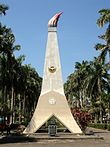
Los Baños, officially the Municipality of Los Baños,, is a 1st class municipality in the province of Laguna, Philippines. According to the 2015 census, it has a population of 112,008 people.
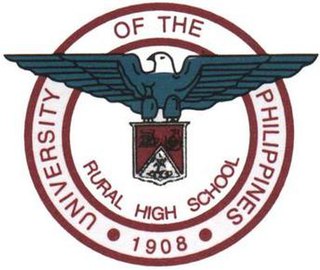
The University of the Philippines Rural High School was established as a subsidiary of the Department of Agricultural Education of the University of the Philippines College of Agriculture, pursuant to Sec.4 of Act 3377 of the Philippine Legislature which was approved on December 3, 1927. The school, with a vocational curriculum, served as a practice school for the training of teachers, provided secondary education in agriculture for those preparing for college, and trained intermediate school graduates in agriculture.
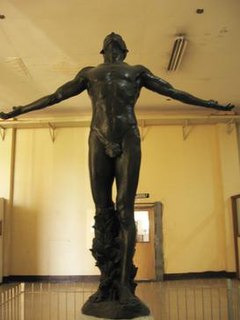
The Oblation is a concrete statue by Filipino artist Guillermo E. Tolentino which serves as the iconic symbol of the University of the Philippines. It depicts a man facing upward with arms outstretched, symbolizing selfless offering of oneself to his union.
The Ateneo School of Government or ASoG is the graduate school of leadership and public service of the Ateneo de Manila University, a private, Roman Catholic university established by the Society of Jesus in the Philippines.
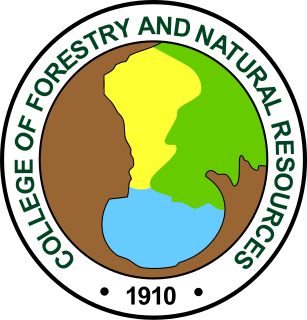
The University of the Philippines Los Baños College of Forestry and Natural Resources is one of the 11 degree-granting units of the University of the Philippines Los Baños (UPLB). It started as the Forest School under the UP College of Agriculture in 1910, making it the oldest forestry school in the Philippines. It is one of the five founding units of UPLB upon its establishment in 1972.

The College of Development Communication (CDC) is the ninth college established under the University of the Philippines Los Baños (UPLB). It is recognized worldwide as a pioneer of development communication as an academic field. It offered the Philippines' first communication course in 1960, as a major under the Bachelor of Science in Agriculture curriculum. In 1974, it became the first to offer academic degree programs in development communication. To date, it is the only academic institution in the world offering degree programs in development communication at the bachelor's, master's, and doctoral degree levels. In 1999, the College was named as one of two national centers of excellence in communication by the Philippines' Commission on Higher Education CHED. The College was awarded a KBP Golden Dove Award for best AM station in 1994 and a Catholic Mass Media Award for Best Educational Radio Program in 2010. In December 2012, the College of Development Communication once again became a Center of Excellence for Development Communication.

The Molawin River, also referred to as the Molawin Creek, is one of the many low volume flowing rocky streams crisscrossing the campus of the University of the Philippines Los Baños and some areas of the town of Los Baños. Molawin Creek crosses the whole of the UPLB campus and essentially cuts it in half making it necessary to construct several bridges throughout the University's history to improve the campus' integrity and general accessibility. Volume of flow depends on the average rainfall of the season and develops into a raging river during typhoons or heavy rainfall. It is a minor tributary of Laguna Lake, one among many small creeks that empty into Laguna de Bay. The origins of Molawin Creek and the other creeks in Los Baños have not been pinpointed but are generally accepted to have their origins high up in Mount Makiling. The name Molawin is a local variation of the name of the Molave tree.

The National Institute of Molecular Biology and Biotechnology, also known as NIMBB, is a research institute of the University of the Philippines. It has four branches which are located in UP Diliman (NIMBB-Diliman), UP Los Baños (BIOTECH-UPLB), UP Manila and UP Visayas.

The University of the Philippines Los Baños College of Agriculture and Food Science is one of the 11 degree-granting units of the University of the Philippines Los Baños. Founded in 1909 as the University of the Philippines College of Agriculture, it is the oldest constituent of UPLB, and is one of the four founding units of the university upon its establishment in 1972.
The College of Arts and Sciences (CAS) is one of the eleven degree-granting units of the University of the Philippines Los Baños. It is the largest college in University of the Philippines System which offers most of the general education subjects required of UPLB students, as well as the highest number of degree programs in the University. The Philippines' Commission on Higher Education has recognized CAS as a Center of Excellence in Biology, Chemistry, Information Technology and Mathematics, as well as a Center of Development in Physics and Statistics.
The College of Economics and Management (CEM) is one of the eleven degree-granting units of the University of the Philippines Los Baños. It is the first in Asia to offer degree programs in Agricultural Economics and has trained agricultural, resource and environmental economists from all over the continent.
The College of Veterinary Medicine (CVM) is one of the 11 degree-granting units of the University of the Philippines at Los Baños. It is the country's first veterinary school.
Ethnovideography is a methodology of using video in the study of peoples, communities, groups or sub-groups. It espouses the use of video to document reality instead of "creating" realities. Hence, ethnovideographic presentations are unscripted. Narrations, background music, sound effects and special effects are not employed. The use of artificial lighting, obtrusive hardware, production crews and all but the simplest camera technique are discouraged.
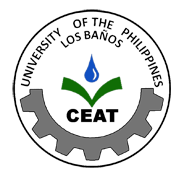
The College of Engineering and Agro-Industrial Technology is one of the eleven degree-granting units of the University of the Philippines Los Baños. It began as the Department of Agricultural Engineering under the College of Agriculture in 1912. It was then elevated into the Institute of Agricultural Engineering and Technology in 1976 and eventually became a full-fledged college in 1983.
The College of Human Ecology is one of the eleven degree-granting units of the University of the Philippines at Los Baños. It is one of only a few institutions in Asia that offers a degree program in Human Ecology and is the first and only one to offer the degree in the Philippines. It is also the first in Asia to offer a degree program in Food and Nutrition Planning.
SEARCA or the Southeast Asian Regional Center for Graduate Study and Research in Agriculture is one of the oldest among 24 specialist institutions of the Southeast Asian Ministers of Education Organization (SEAMEO). Founded on 27 November 1966, SEARCA is mandated to strengthen institutional capacities in agricultural and rural development in Southeast Asia.

The College of Public Affairs and Development (CPAf) is one of the colleges in University of the Philippines Los Baños. It offers graduate instruction, research and extension programs that center on the study of communities in transition and their institution such as resource access, governance, policy and education, inter alia, and the intrinsic interplay among the institutions. It can be found at the forestry area or the upper campus of the university. That is approximately a hundred meters from the entrance to the UPLB College of Forestry and Natural Resources.
The UPLB Graduate School is a professional graduate school and is one of the eleven degree-granting units of the University of the Philippines Los Baños. Located in Los Baños, Laguna, the school also integrates and administers graduate programs of the university in agriculture, forestry, the basic sciences, mathematics and statistics, development economics and management, agrarian studies and human ecology. It is responsible for the implementation the policies, rules, and regulations of the graduate faculty in the university.














